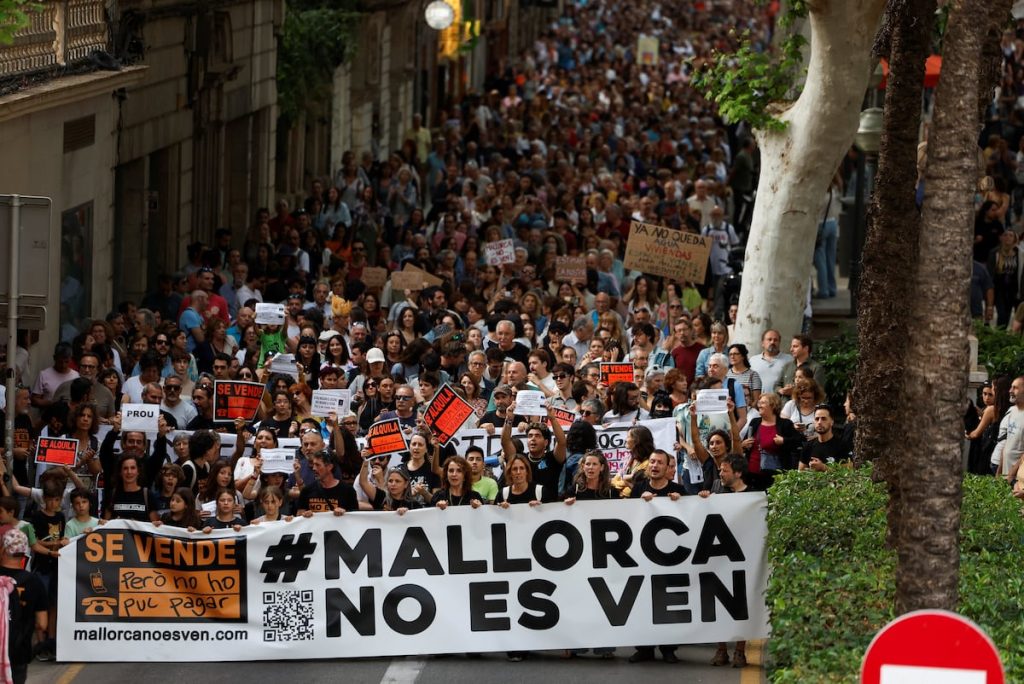Under the slogan “Mallorca is not for sale,” thousands of people marched in Palma on Saturday afternoon to protest the acute lack of affordable housing for residents of the island and denounce the touristic overcrowding of the archipelago, which results in difficulties accessing public services and carrying out normal daily activities. More than 10,000 people, according to the National Police, took to the streets in Palma, coming from all parts of Mallorca on a day when residents of Menorca were also called to protest in a rally in the municipality of Alaior. In Ibiza, a thousand people took to the streets on Friday afternoon under the banner “Enough is enough” in a demonstration where participants called for unity among the island’s inhabitants to tackle touristic overcrowding and ultimately “be able to live in Ibiza.”
The Balearic Islands have experienced the highest increase in prices in recent years. According to a study by the real estate portal Fotocasa, the rental housing price in the islands has surged by 158% in the last ten years, the highest increase in the country. This increase has been 12% in the last year alone. Additionally, it is the region with the highest rental pressure, with more than 142 candidates for every housing ad, according to a recent report by the company Alquiler Seguro. This situation is worsening and has caused growing social unrest, leading many residents to leave the autonomous community. This exodus to other places results in a lack of workers in many job sectors, such as healthcare or law enforcement, making it difficult to meet citizen demands. Many attribute this shortage of housing to the growing touristic overcrowding.
Chants like “we want to live with dignity” were heard throughout the march, starting from Estaciones Square and ending at Paseo del Borne, with a significant presence of families with young children and young people. Banners reading “Having a home is not a luxury, it’s a right” or “We had a life. SOS Residents” illustrated the protesters’ demands. Some used irony, like a young woman dressed as a luxury real estate agent leading a man bound in chains wearing traditional Mallorcan attire. Citizens like Gustavo Martín, who attended the protest, expressed concerns about the housing situation and its impact on the community. Sonia, another protester, emphasized the need for sustainable tourism and highlighted the impossibility of renting or buying a home, making it challenging to live in the area.
The civic platform Banco del Tiempo in the municipality of Sencelles organized the demonstration. This small association released a viral video denouncing how high housing prices were displacing residents from the town. Many residents shared personal stories in the video, explaining how they could no longer afford to live there due to rising costs. The positive response to the video on social media led to the organization of the protest, which was joined by numerous civic associations, neighborhood groups, and social and environmental movements. Javier Barbero from Banco del Tiempo de Sencelles described the housing situation in the Balearic Islands as an “emergency,” preventing people from having a life project on the island. They hope the protest will lead to urgent measures being implemented, such as declaring a housing emergency in the islands or applying the Housing Law to designate tense areas, as a starting point.
The situation is particularly challenging for lower-income residents of the Balearic Islands, who are being priced out of the housing market due to tourism-related pressures. The organizers of the protest aim to raise awareness about the need for affordable housing and sustainable tourism practices to ensure the well-being of residents and the sustainability of the islands. They are calling on authorities to take action and implement measures to address the housing crisis urgently. The growing discontent among residents highlights the urgent need for solutions to ensure that people can continue to live and work in the Balearic Islands without facing financial hardships or being forced to leave their homes.


